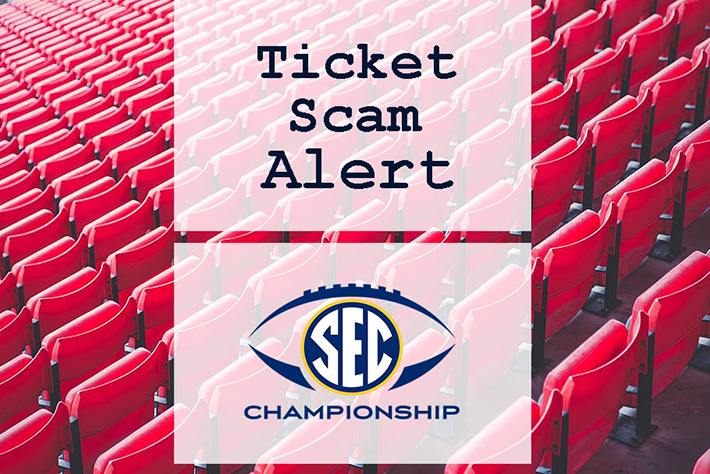
Attorney General Chris Carr and the Better Business Bureau (BBB) of North Georgia are teaming up to warn Georgians about ticket scams ahead of this weekend’s Southeastern Conference (SEC) Championship Game between the University of Georgia (UGA) and Louisiana State University (LSU). Big games present an opportunity for scammers to exploit consumers through the sale of fake, void or stolen tickets on the secondary market. Not only can consumers lose money in these scams, but they may also fall victim to identify theft if both personal and financial information are provided as part of the transaction.
“With the No. 1 Georgia Bulldogs seeking yet another SEC title, it’s important that fans who are hoping to attend the big game in person remain vigilant when purchasing tickets,” said Carr. “Criminals will take advantage of any opportunity to steal other people’s hard-earned dollars, so make sure you’re dealing with reputable sellers and avoid scenarios that sound too good to be true. In anticipation of conference championship weekend, our Consumer Protection Division has put together some key tips to help you avoid scams, protect your wallet and cheer on the Dawgs with peace of mind.”
Atlanta will take center stage this weekend with the reigning national champion Georgia Bulldogs set to take on the LSU Tigers on Dec. 3, 2022, at Mercedes-Benz Stadium. Not surprisingly, the game is sold out. For those still hoping to attend the SEC Championship in person, it is important to understand the possibility of encountering a scam when searching for tickets on the secondary market.
“The internet has made it easier for consumers to find and purchase tickets to events. Unfortunately, some online ticket resellers are fraudulent,” said Simone Williams, media and public relations lead for the BBB. “The BBB received 15,462 complaints last year about online event ticket purchases and the BBB Scam Tracker has received numerous reports from people who bought fake tickets to real events or bought tickets to events that never materialized. If you’ve spotted an event scam, report it to BBB Scam Tracker to alert others.”
The Attorney General’s Consumer Protection Division and the BBB of North Georgia are offering the following tips to help fans avoid ticket scams:
- Buy tickets from reputable sites. You can check whether the business is accredited with the Better Business Bureau by going to bbb.org. You may also want to search the internet for complaints and reviews of a business.
- The so-called ticket scalpers who approach you outside the event gates are often scammers peddling bogus tickets. Don’t risk it.
- You can also find a ticket broker through the National Association of Ticket Brokers, which requires its members to guarantee that every ticket sold on their websites is legitimate.
- Inquire with the organization hosting the sporting event about a safe method for reselling and buying verified tickets.
- Be very wary of buying tickets through Craigslist ads.
- Avoid wiring money to the seller, as this is often an indication of a scam.
- Be wary of deals that sound too good to be true. Scammers often try to lure consumers into handing over their money by offering tickets or merchandise at below-market rates.
- Protect your identity by refraining from posting pictures of your tickets online or on social media. Scammers can easily take the barcodes in an online post and use them to create fraudulent tickets and steal personal information.
- Ticket brokers are required by Georgia law to register with the Georgia Athletic and Entertainment Commission and to comply with other regulations, including providing their license number in any internet, broadcast or print advertising. To verify a ticket broker’s license, visit sos.ga.gov, click on “Licensing” and then “Licensee Search.”
To file a complaint against a ticket broker, visit the Georgia Athletic and Entertainment Commission website.
If you have a dispute against a company that facilitates the resale of tickets between individuals, you can file an online complaint with our office or call our Consumer Protection Division at 404-651-8600.


Chattooga Opinions
Medically Supervised Weight Loss: Inside Premier Weight Loss & Medispa

Chattooga Local News
Georgia Power Files Plan for Customer Rate Decrease with Public Service Commission

Chattooga Local Government
Carr Pushes for Permanent Halt of Medicare and Medicaid Funding for Child Sex-Change Procedures

Bulloch Public Safety
02/20/2026 Booking Report for Bulloch County

Bulloch Public Safety
01/26/2026 Booking Report for Bulloch County

Bulloch Public Safety
02/09/2026 Booking Report for Bulloch County

Bulloch Public Safety
01/22/2026 Booking Report for Bulloch County

Bulloch Public Safety
02/16/2026 Booking Report for Bulloch County

Bulloch Public Safety
02/02/2026 Booking Report for Bulloch County





